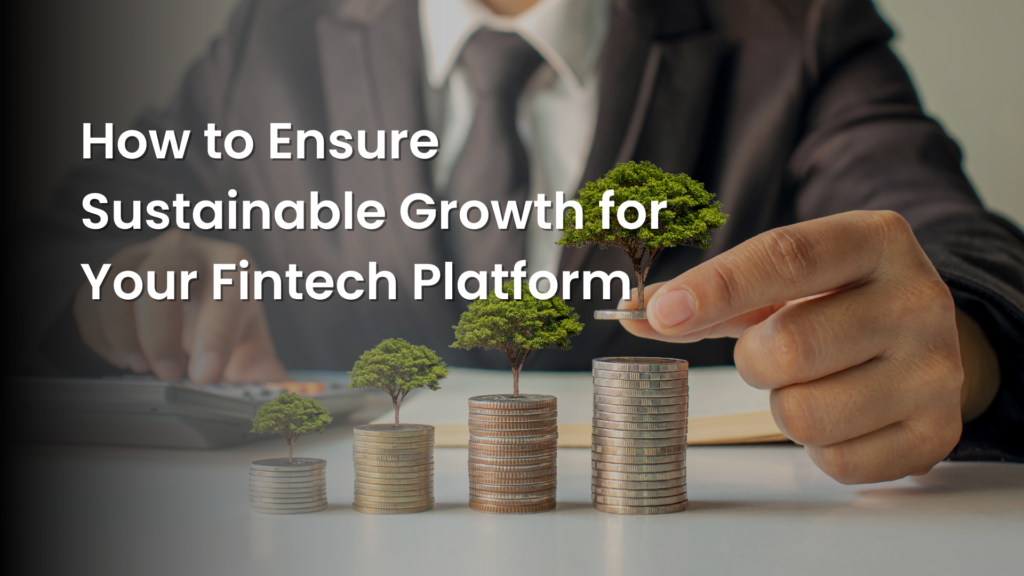The fintech industry is developing extremely quickly, with new, more sophisticated products and services appearing every year.
It can be challenging for companies that have created fintech platforms and apps to strike a balance between being abreast of a rapidly expanding industry and ensuring sustainable growth inside their own platform.

However, despite the extremely competitive environment that surrounds the business, there are a number of steps that can be taken to make sure that finance technology platforms have all the resources at their disposal to enable them to expand organically and reach new audiences.
In light of this, let’s examine six strategies businesses can use to ensure long-term growth for their fintech platform
Almost every company in almost every industry is affected by this. Take time to evaluate your platform’s offering and a few readiness-related concerns before you start thinking about how to leverage growth.
When it comes to scaling a firm, it’s not just about raising your goals; you also need to think about whether your platform can handle more work without suffering performance penalties.
If you expand your product before you’re ready, it could cause extra issues that reduce your current revenue. Additionally, spending to increase your reach could hurt your bottom line if there is no market for what you’re selling.
It’s crucial to balance expectations between developing a top-tier product and controlling the time it takes to launch it on the market when predicting growth in the fintech industry.
Here, it’s crucial to keep in mind that in order to ensure growth, more than simply your platform needs to be scalable. Your entire business model must conform to this, including your organisational structure, technical foundation, compliance policies, and workforce. This raises concerns about your goals in terms of growth rate and the competencies that your team must acquire to ensure sustained platform scalability.
Even though you might be eager to step up your expansion, creating a scalable infrastructure takes time. This entails creating a practical roadmap that takes into account both your future goal and the level of expertise needed to expand in a sustainable way.
Trustworthy brands take time to develop, especially in the fintech and open banking industries.
When building a fintech service, it’s likely that open banking will be essential to your business, delivering the cutting-edge features that make it stand out. The main idea behind open banking is to utilize a third party to securely access financial data from a bank with the user’s permission. After that, it will extract the data and use it to offer individualised financial services. In a setting where GDPR is in effect, this privacy issue is important to all parties and can be disclosed or withheld at any time.
You will always need to obtain permission to access the financial data of your users if you want your fintech to flourish. As a result, obtaining authorization to access financial data is crucial to a fintech’s growth.
The main area where you should aim to increase spending if you want to expand your fintech company is security. Every fintech company should place a high premium on protecting the personal data of their clients, and there should never be any chance of oversight when it comes to issues of security, compliance, and regulation rules throughout all areas of business.
Spending money on infrastructure and preparedness improvements across the board is necessary for growth, but no amount of spending can undo the reputational harm that a company can experience from a security breach.
Although it may appear that investing a lot of money on a less-than-glamorous part of your fintech platform is required, security precautions can actually be a very strong selling point for your business.
Despite the fact that scaling might be expensive, securing expansion can also lead to the creation of new sources of income.
Since building trust is a necessary step in introducing a fintech platform to new users, knowledge can be shared and even paid for. You can make use of high-quality content in the form of PDF downloads, podcast subscriptions, and video-based learning by creating industry-specific online learning tools.
The appeal of monetizing your industry knowledge is that it can enhance your selection of visitor-friendly material and enhance your standing as a thought-leader and subject-matter expert.
It is not sufficient to lay out your growth strategy and take into account the key elements that will play a role as your platform expands. Additionally, you must consider all the elements that will affect your development.
You can better determine the amount of money you’ll need to launch your product and if you can afford to grow as you anticipate by taking the time to properly study your anticipated growth rates and the markets that you’ll penetrate as a result.
By following the advice given above, you’ll not only guarantee that your product reaches the market but also that your platform doesn’t end up in a dead end that prevents future growth
Although the fintech sector may be challenging and unpredictable, you shouldn’t let that deter you from expanding your business sustainably as and when the time is right for you and your fintech platform.